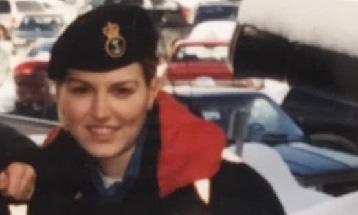Her story

Born and raised in Montreal, Anneliese was a self-described tomboy growing up. She loved camping—still does—and listening to her uncle’s stories about serving in the U.S. Army. “I thought I knew what the army was all about,” she says.
Volunteering in her community was always a major part of Anneliese’s life. At 12, she worked with the Salvation Army. Later, she became a “candy striper”—known today as a junior volunteer—at the Montreal General Hospital.
When she graduated from McGill University in 1991 with a Bachelor of Arts in English, Anneliese found jobs were scarce. Motivated by her love of camping and fond memories of her uncle’s military experience, she joined the Montreal-based Canadian Grenadier Guards, and did her basic training in Valcartier. What started as a part-time job turned into a four-year adventure that made a lasting impact on her life.
In the early 1990s, women were just starting to become more prevalent in combat arms. “I think there must have been about 30 of us females, and about 3,000 men,” she recalls of her training in Gagetown. “There was a lot of pressure.”
During training in Farnham in the winter of 1993, Anneliese’s back was injured, leading to pain and nerve damage. Later that year, she severely damaged her ankle. Almost 30 years later, Anneliese still deals with discomfort resulting from these injuries.

But she treasures her experience in the Reserves, which included duty in the Middle East. She served as a Second Lieutenant, and ended up taking on various roles within her regiment, including financial management and sexual harassment reporting.
“I loved the camaraderie and especially being there for other women in the unit. I think that was probably one of my more important roles, almost as important as making sure that everyone received their pay without a hitch.”
However, the job satisfaction was eclipsed by the shadow of meeting with young women who would arrive at her office with a “finance problem” that would reveal itself as a call for help following sexual harassment, or worse.
“I wasn’t prepared or trained to handle these confessions from women who were just a couple of years younger than me,” she shares. Anneliese says that none of her superiors wanted to escalate things for fear of reprisals, and she didn’t have any way to help other than to listen.
In 1996, she left the Reserves. “My civilian career at that point was getting increasingly demanding. I was a change management consultant, and I became pregnant. I guess I assumed that I would probably not have much of a role being pregnant in the military.”

When she left the military, it was as though a steel door slammed shut in her mind. She left behind the memories of her own experiences and those of the women who had trusted her. She regrets not doing more. “I should have reported things, but there was really no mechanism for this, it was all so new. And no one wanted to be singled out.” It was only years later that she started to piece together the impact.
After releasing from the army, she appeared to be doing well, busy with project management, public relations and fundraising. But in reality, she struggled to hold things together.
Her first marriage ended while she was pregnant. After a decade of a abusive relationships and periods of living paycheque to paycheque, she felt emotionally scarred and physically broken. Hyper-vigilance, nightmares and flashbacks kept her in a state of constant stress.
One day, an old friend told her, “You used to have the sweetest boyfriends in high school and university, and after the military, I don’t know what happened, but things really went downhill.”
Her healing journey

That conversation launched Anneliese’s healing journey. She started with returning to positive activities, including painting and drawing. You can see her art on Instagram as artful_recovery. She returned to work in the not-for-profit sector, developing and implementing projects which help children and adults with physical disabilities. Volunteering also made a comeback in her life with her involvement in the Respect Canada Campaign, and she continues to be a resource and mentor for women trying to escape abusive relationships.
“Just as things went into a negative spiral for so many years, I have been focusing on building a positive spiral to get things going in the right direction.”
A fellow Veteran suggested Transcendental Meditation (TM) to deal with stress. She took the training through the Canadian Women’s Health Initiative, which paid for the cost for herself and her family. Today, they all meditate at least once a day.
“It’s like a 20-minute holiday,” she says. “It’s a state between dreaming and waking; you can have a dream-like experience, but you’re aware of everything around you.” Physical pain from her military injuries are also less bothersome.
Nightmares occur rarely now and a feeling of balance has returned to her life. She credits TM as instrumental in her healing journey as it is a way to quiet her mind, without needing to re-live the traumatic events that happened. “It gives me a way to continue healing and helping others.”
The Canadian Women’s Wellness Initiative and the RESPECT Campaign received financial support from the Veteran and Family Well-Being Fund.




